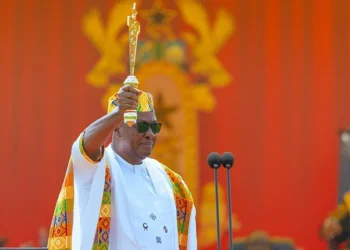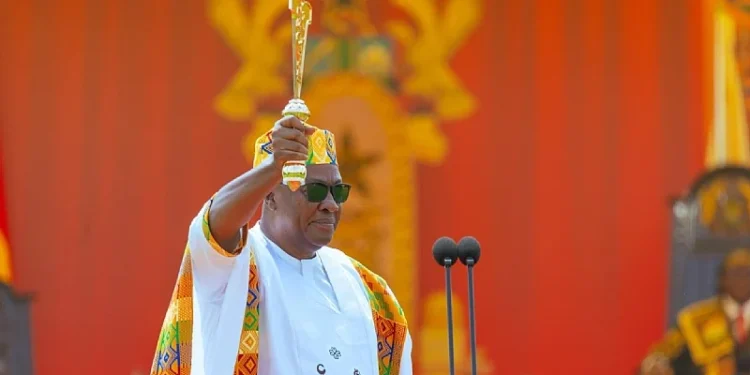In the latest development at the Tamale Teaching Hospital, the Health Minister, Hon. Kwabena Mintah Akandoh, has made an earnest plea to medical professionals of the Tamale Teaching Hospital to reconsider their ongoing strike.
In a tone both conciliatory and assertive, the Minister emphasized his commitment to safeguarding the welfare of healthcare workers, assuring them of his personal dedication to their interests.
“Please… For the past two or three days, I have been speaking to stakeholders in this sector, and please, it isn’t everything we can put out there as leaders. I am prepared for us to come around the table and discuss whatever we need to discuss.”
Hon. Kwabena Mintah Akandoh
While some of his comments appeared to seek reconciliation, others indicated his desire for a shift in operational accountability within public healthcare institutions.
He pointed out the unsustainable cycle of government provision and facility-level neglect that undermines long-term efficiency.
According to the Health Minister, hospitals must begin leveraging their Internally Generated Funds (IGFs) more responsibly. “There are some things the hospital can easily do with its internally generated funds. Please, let’s confront the issues as they are.”
Additionally, he highlighted the broader financial burden on the health sector, lamenting the lack of accountability on the part of health facilities.

He pointed out that the current approach—where the government repeatedly supplies equipment to facilities, only to later be called upon to fund their maintenance or replacement once they become obsolete—is simply unsustainable.
The Minister’s remarks follow a recent uproar within the facility that has unsettled operations and sparked tensions between the Ministry and health sector unions.
The unrest began after the abrupt dismissal of Dr. Atik Adam, the Chief Executive Officer of the hospital, over alleged mismanagement and a case of medical negligence believed to have contributed to a patient’s death.
Rethink on Health Equipment Use Urged
Furthermore, Hon. Kwabena Mintah Akandoh urged hospital administrators to stop viewing medical equipment solely as long-term costs.
Instead, he encouraged them to adopt simple, practical revenue strategies that could generate some income from the use of these machines.

He emphasized the need for a collective rethink on how such funds are managed and called for a new approach to sustain healthcare infrastructure.
While acknowledging the frustration of medical professionals, he reiterated that his perspective stems from a desire to promote shared responsibility. “Maybe I’m looking at it from a different direction. We share ideas. Let’s pursue the interest of the ordinary.”
However, his actions have not gone unchallenged. The Ghana Medical Association (GMA) has openly condemned how Dr. Adam was relieved of his post, describing the Minister’s conduct during his unannounced visit as unprofessional.
Their statement demanded not only a retraction but also a public apology.

Still, the Minister seems to be walking a tightrope—balancing the urgency of restoring services at the hospital with the political and ethical fallout from his intervention.
His appeal is not merely about ending a strike, but about resetting a troubled relationship between government oversight and professional autonomy.
While some have interpreted his language as overreaching, others see in it a rare gesture of accountability and openness.
In a sector known for entrenched bureaucracy and sporadic agitation, Akandoh’s willingness to engage directly with stakeholders may signal a change of approach.
Yet, questions remain: Was the CEO’s dismissal justified? Will this act restore trust, or further deepen existing divisions within the health service? And more crucially, will the Minister’s assurances be followed by genuine systemic reforms?
What is clear, however, is that the Health Minister has placed himself squarely at the center of a pivotal moment in Ghana’s health governance.
Whether this intervention proves a healing balm or a deepening wedge depends not only on how it is received but on what comes next.
READ ALSO: Band Dismisses Misconception of Borborbor























